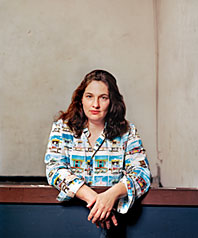
For readers wondering how A.M. Homes, raised in a nurturing, progressive family in the suburbs of D.C., came to write stories of destructive dislocation, the novelist’s new memoir, The Mistress’s Daughter, offers a clue or three. In the early nineties, Homes, who always knew she was adopted, finally met her birth parents, and they didn’t quite live up to her fantasies of being the love child of Jack Kerouac and Susan Sontag. Her birth father would only meet her in hotel lobbies, made her take a DNA test, and then refused to give her a copy of the (positive) report. (He recently told People magazine he wasn’t even her father.) His onetime mistress was a broken, lonely woman who seemed to need mothering of her own. Yet Homes, who finally completed the book after her birth mother’s death, doesn’t wallow in her disappointment. She spoke with New York about the pain of writing the book, the relief of finishing it, and her distaste for memoirs.
It took you almost fifteen years to publish this. Why so long?
As it was happening, I was making all these notes, and then I wrote 100 pages and gave it to somebody to read—a very close ally involved in my publishing life—who hated it. It just froze me. And then Granta came to me as I was finishing my last novel. They were doing this adoption anthology. And I said to myself, Come on, Homes, you’ve got to be able to pull something out of this. So I went back to [the notes] and I thought, They’re really not that bad.
Does this book help explain why you’ve written such dark stuff in the past?
I think I’m compelled toward truth always. One of the things I’ve always done with my characters is make them have to face the truth of who they were even if it was excruciatingly painful to them, whether it’s the couple in Music for Torching or the reality of who my family is.
Except in this case you’re making yourself suffer instead of your characters.
I suffer for my characters, too.
Do you feel better now?
I spent a long time feeling like at any moment I just would be not part of the planet anymore. I do feel better now. But people keep saying, “It must have been so cathartic for you.” And I think, Is vomiting cathartic?
I think it usually is.
I don’t. I have a fear of vomiting. I equate it with death.
Are you dreading the reviews, especially after your last novel, This Book Will Save Your Life, got such a mixed reception?
I think getting slammed in the New York Times two weeks before the publication date, which actually gave critics around the country a chance to crib from that review, had a lot to do with the “mixed” reception. It wasn’t entirely mixed, it’s just the mixed part was very loud. I think about reviews of the memoir: What’s a negative review of a memoir? “Not only is she a lousy writer, her life sucks.”
I assume you haven’t heard from your birth father about the book.
I haven’t, no. I didn’t write it to get a response from him, that’s for sure. But my [adoptive] mother has read this twice, and she keeps saying to me, “It’s the best thing you’ve written.” Which to me as a novelist, who just works so hard on these books, is ironic.
How do you feel about memoirs in general?
I’m completely opposed to them. People say, “Aren’t you young to have written a memoir?” And I say, “Well, I only remembered one thing.” As much as you’re talking about an experience in your life, I don’t think it means you’re going to talk about every experience of your life. And in a way it’s a memoir, and yet it’s about two people I never knew, and it’s about a life I never had, which I think is really interesting. It kind of becomes a Beckett thing.
You write that you have a family now, but don’t actually reveal very much about your current life, and people will no doubt wonder about it.
When I would write fiction, I would make up things, and people wondered. No matter what I do, it makes people wonder. I think that’s just my job.
How much did you wonder what it would have been like to grow up with your birth parents?
I don’t know that I would have survived growing up with my biological mother. She claimed my father wanted to adopt me, but I think it would have been like Cinderella, in that they’d never let me out of the kitchen.
Are you making an argument for nurture being more important than nature?
No, I feel like in many ways I really am an amalgam. I grew up in this very intellectual and artistic household that certainly allowed me to develop that side of myself, but I also think part of my drive, or how I move through the world, is definitely biological.
You were a writer for The L Word. Are you becoming a TV writer?
I am creating a show for HBO. I can’t tell you [what it’s about]. But everyone writes a pilot for HBO. It’s the one way novelists get health insurance, okay?
The Mistress’s Daughter
By A.M. Homes. Viking. 240 pages. $24.95.
